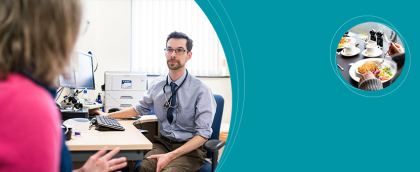
Risk factors connected to cancer are sometimes exaggerated in the media and public campaigns, and recently, the link between ovarian cancer and obesity has resurfaced. But is there actually a link between obesity and ovarian cancer, and how reliable is the science?
In their recent campaign, Cancer Research UK is highlighting obesity as a cause of various cancers, including ovarian, and says that obesity is “the UK’s biggest cause of cancer after smoking”. The campaign is accompanied by adverts, billboards and a prominent social media campaign.
The link
In short, yes – there is a link between obesity and ovarian cancer, but it only carries a slight increase in risk. Obesity (that is to say being very overweight with a lot of body fat) is a hugely complex issue, combining economic and social factors as well as lifestyle choices. How it may contribute to a person’s risk of developing certain cancers is currently not well understood, although there are some theories and scientists are carrying out more research to understand these better. A study in 2014 suggested that seven per cent of ovarian cancer cases in the UK could be caused by obesity, but what we still do not know is how being obese might cause ovarian cancer.
Risk factors
When considering risk factors connected to ovarian cancer, there are far more significant ones than the risk obesity may pose.
Age is one of the most significant factors: more than half the cases of ovarian cancer diagnosed are women over 65 years. Ovarian cancer affects younger women as well, but at a lower rate.
The second risk factor to consider is genetics and family history. Between 15 and 20 per cent of cases of ovarian cancer are linked to a mutation in one or more genes known to increase the risk of ovarian cancer, genes which have been passed on from either the mother or father. You can read more about the role of genetics in ovarian cancer here.
There is little you can do as an individual to decrease the age-related risk factor, short of knowing the symptoms and seeing the GP if you are concerned. We would encourage women with a strong family history of breast and ovarian cancer or a genetic risk you already know about to discuss possible options, including risk-reducing surgery, with your GP.
Living your healthiest life
Even though obesity poses a very small potential increase to the risk of developing ovarian cancer, it is still important to consider your body weight, diet, and overall health.
Dr Vicki Barber is a GP from Northamptonshire. She says: “The news about obesity should not be cause for distress among women in the general population or people with a diagnosis of ovarian cancer. As an individual, the most important thing you can do to decrease the risk of ovarian cancer is to not worry too much about your body weight, but to simply to live as healthily as you can.”
If you have any concerns you can contact our nurse-led Support Line for information and support.


